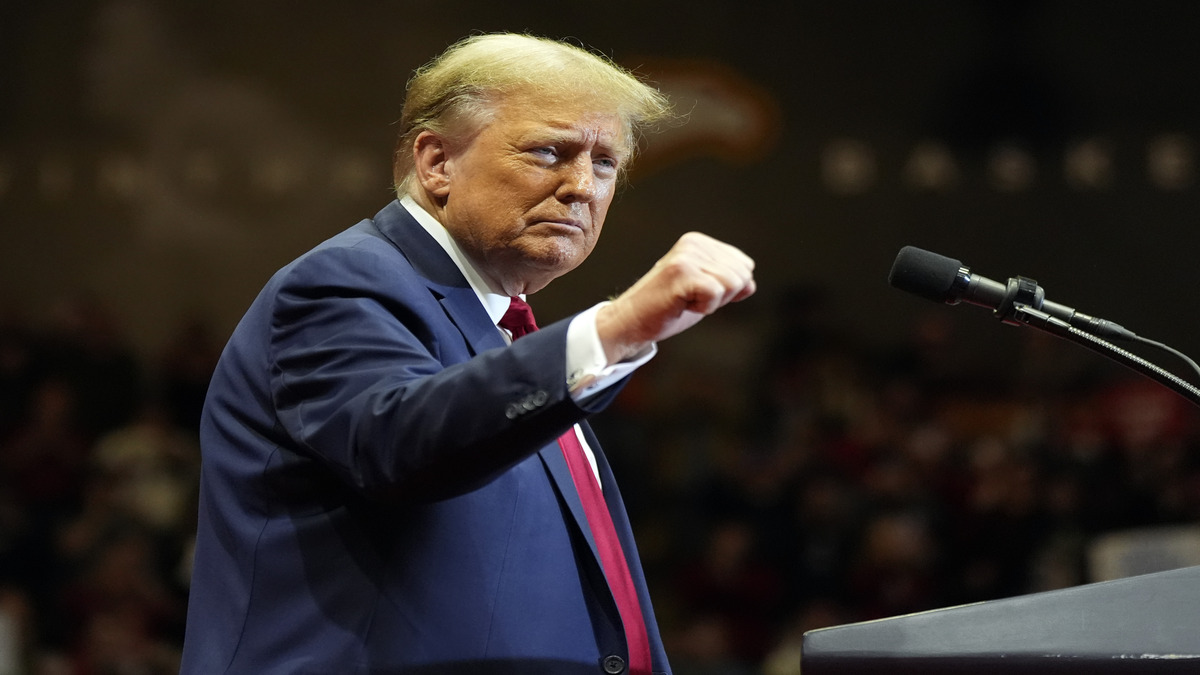Former United States president Donald Trump’s legal troubles seem to have no end. A New York judge on Friday (23 February) formally directed the Republican leader to cough up a fine of $454 million (over Rs 3,762 crore), including interest, in his New York civil fraud case.
Trump has one month to appeal the verdict but he would still need to post the full amount to do so. While the former president says he is a billionaire, does he have such a massive amount of cash? What happens if he cannot pay?
Let’s take a closer look.
What is the judgement?
Last week, New York judge Arthur Engoron found Trump and his sons, Donald Trump Jr and Eric Trump, liable for financial fraud. He ruled the former US president misreported the value of his properties to obtain advantageous loan and insurance rates, reported The Guardian.
The judge ordered Trump to pay $354m in penalties plus $100m in pre-judgement interest. He also asked Trump’s sons to pay $4 million each.
Trump has also been barred from holding a top role at any New York company. He cannot apply for loans from banks registered in New York. His sons have been banned from leadership roles in the state for two years, according to Reuters.
The former US president has denied any wrongdoing, calling the case a “witch-hunt” by political opponents. Trump, who is likely to be the Republican nominee for the upcoming presidential elections, has said he will appeal the verdict.
Impact Shorts
More ShortsCan Trump afford to pay?
According to Forbes Magazine, Trump ’s total net worth is $2.6 billion, most of it tied up in real estate. In 2021, the New York Attorney General’s Office estimated his annual net worth at $2 billion, reported BBC.
Last year Trump claimed in a deposition he had “substantially in excess” of $400 million in cash on hand.
Besides the penalty in the civil fraud case, Trump owes $83.3 million in damages to writer E Jean Carroll for defaming her after she accused him of rape.
In just two months of 2024, the Republican has to shell out nearly $550 million in these two civil cases alone. His legal fees are also piling up as he fights four criminal cases at the federal and state level, noted BBC.
If Trump does not have such an exorbitant amount of cash on hand, what are his other options?
Trump’s options to raise cash
Trump has 30 days to file an appeal in the New York civil fraud case. If he does, it would put the verdict on hold till the higher court reviews the case.
However, if Trump wants to avoid paying the fine or getting his personal assets seized during the appeal process, Trump will have to deposit the full amount within 30 days, according to BBC.
Trump has two options. He can either pay the amount in full or get a $35 million bond against his assets, which might comprise Fifth Avenue Trump Tower, 40 Wall Street, his Mar-a-Lago estate, or his various golf courses in the US, reported The Guardian.
If Trump secures a bond – a third-party guarantee that he can pay the full penalty, it would cost him additional millions in interest and fees. He would also likely be asked to put up collateral.
“To secure a bond from a bonding company, a person typically needs to put up about 10 per cent of the total amount owed,” Steven Cohen of the New York Law School told BBC.
Trump could also try to generate money to pay the hefty fines by selling his investments or other assets. “He’s got to think about what to do with his assets, how to perhaps liquidate businesses to come up with that money,” Sarah Krissoff, a former federal prosecutor, told BBC.
He might also resort to fundraising to come up with the amount. Trump cannot use his official presidential campaign funds for personal uses not linked to the campaign. As per Politico, the former US president could tap into his political action committees (PACs), Save America and Make America Great Again, but their coffers may not be enough to afford the penalties.
Save America PAC has already been used to cover nearly $40 million on Trump’s lawyers’ fees and other related expenses since his first indictment last March, according to Forbes.
What if Trump fails to pay?
If Trump fails to put up cash or secure a bond, then the New York civil fraud case verdict will come into effect immediately and a sheriff could start seizing the Republican leader’s assets, noted Politico.
The New York state attorney general, Letitia James, who brought the civil fraud case against Trump told ABC News in an interview this week that she will seize his assets if he fails to pay the $355m fine.
“If he does not have funds to pay off the judgment, then we will seek judgment enforcement mechanisms in court, and we will ask the judge to seize his assets,” she said.
James also threatened to seize Trump’s buildings, including his 40 Wall Street skyscraper in Manhattan. “We are prepared to make sure that the judgment is paid to New Yorkers, and yes, I look at 40 Wall Street each and every day,” James told ABC.
Dismissing the threat, Trump’s lawyer Alina Habba said James would not succeed. “I will tell you this, that goal will not be successful and that is the message I can give to everyone listening here. It will not be successful,” Habba told Fox News.
If Trump loses his appeals and still refuses to pay, he could be held in contempt of court and ordered to pay additional fines. The New York state could garnish his wages or even imprison him, however, the latter is “extremely unlikely”, according to Reuters.
With inputs from agencies


)

)
)
)
)
)
)
)
)



